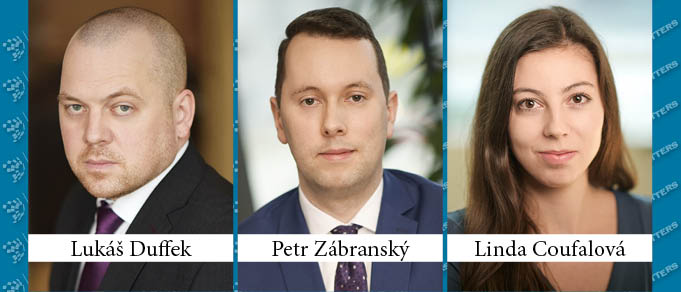Electronic surveillance is regulated by Article 158d of the Rules of Criminal Procedure (hereinafter the “RoCP”), in the marginal section called “Surveillance of Persons and Items”. However, the term “electronic surveillance” itself is foreign to the RoCP, and this area is not regulated in sufficient detail on a legal level. At the same time, electronic surveillance is being used increasingly in practice and undoubtedly represents a significant intrusion into the privacy of the persons under surveillance.
Recently, the High Court of Prague dealt with this problem in the case of a defendant who had intentionally divulged classified information, which was captured by means of electronic surveillance in another person’s dwelling. However, what was crucial in this case was that surveillance was permitted by the judge in compliance with Article 158d Par. 3 of the RoCP and was carried out in the dwelling for the purposes of other criminal proceedings. Consequently, criminal proceedings were initiated against the defendant, and the same recording that was initially made and permitted for the purposes of other criminal proceedings served as evidence in this case.
The gist of the issue discussed by the High Court was whether Article 158d Par. 10 of the RoCP, which establishes the applicability of gathered electronic surveillance materials to other criminal proceedings (specifically, when the other criminal proceedings are conducted for an intentional criminal offence or if the person whom surveillance concerns gives consent to it), relates only to Article 158d Par. 2 of the RoCP, as the law explicitly stipulates (and therefore impacts only cases involving electronic surveillance carried out outside of specially protected areas and conducted only with the state attorney’s consent), or whether it also relates analogically to the situations anticipated in Article 158d Par. 3 of the RoCP (i.e. whether the applicability of electronic surveillance can be established in relation to other proceedings even in cases where the inviolability of a dwelling is breached, and therefore the judge’s permission is required).
The state attorney was convinced that electronic surveillance materials gathered by these means are admissible evidence, for they fulfil all the legal requirements and were presented in proceedings conducted for an intentional criminal offence, so the applicability of surveillance materials is established exactly by Article 158d Par. 10 of the RoCP. The state attorney also added that establishing a rule that the records of surveillance of persons and items permitted by the judge could not be used in other criminal proceedings would lead to the inability to utilize a piece of evidence that could be used not only to the defendant’s disadvantage, but also to his/her benefit. According to the state attorney, the inability to utilize such evidence would ultimately imply an unreasonable denial of the right to a fair trial.
The High Court of Prague disagreed with the state attorney’s argument and as regards the ability to utilize surveillance materials in other criminal cases stated that “following a grammatical interpretation, it can be conclusively concluded that surveillance must be permitted by the rules alone (by the conditions stated in) Art. 158d Par. 2 of the RoCP, whereas the permission arising from Art. 158d Par. 3 of the RoCP cannot be used either in this case or analogically.”
The High Court concluded that the application of Art. 158d Par. 10 of the RoCP to Art. 158d Par. 3 of the RoCP is not possible, because Art. 158d Par. 10 contains an exhaustive list and applies to the violation of rights guaranteed by the Constitution. Furthermore, the Court said that “in each case, the rule of due legal procedure (Art. 2 Par. 1 RoCP) that also has a constitutional dimension (Art. 8 Par. 2 of the Charter, cf. Art. 36 Par. 1 of the Charter and Art. 6 Par. 1 of the Convention) must be given priority over the rule for determining the facts of a case without reasonable doubt (Art. 2 Par. 5 RoCP). Efforts to find the truth at all costs, that is, even at the cost of exceeding the limits of law, would lead to illegality and unacceptable arbitrariness. The rule of due legal procedure must not be sacrificed to the expediency and effectiveness of criminal prosecution, or to the use of “invasive” means, to which co-called electronic surveillance certainly belongs. Thus, according to the Appellate Court, Article 158d Par. 10 RoCP can only be read in conformity to the constitution as having no impact on the rule of permission in Article 158d Par. 3 RoCP, and its possible use implies serious irreparable procedural error and in this case leads to the absolute ineffectiveness of the evidence.”
The judgment of the case and the expressed legal opinion that before carrying out electronic surveillance in strictly protected areas it is necessary to receive separate permission from the judge in every single case can undoubtably be considered highly valuable from a practical standpoint, for electronic surveillance is not regulated well enough by law, and a great number of questions rest on decision-making practice itself. At the same time, it can be acknowledged that the principles of due legal procedure and the rejection of analogical law to the disadvantage of the offender have a higher priority to the rule of determining the facts of a case beyond reasonable doubt.
By Lukas Duffek, Partner, Petr Zabransky, Senior Associate, and Linda Coufalova, Junior Lawyer, Rowan Legal



